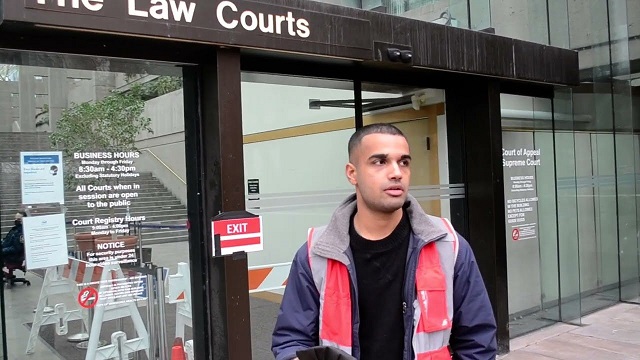Alberta
Alberta’s first COVID-19 death – Edmonton area man in his 60’s

From the Province of Alberta
One Albertan has died as a result of the virus, the first COVID-19 related death in the province. Aggressive public health measures continue to help limit the spread of COVID-19.
Latest updates
- 27 additional cases of COVID-19 have been confirmed in Alberta, bringing the total number of cases in the province to 146.
- Cases have been identified in all zones across the province:
- 101 cases in the Calgary zone
- 29 cases in the Edmonton zone
- 10 cases in the North zone
- Three cases in the Central zone
- Three cases in the South zone
- Of these cases, five are currently hospitalized, two admitted to intensive care units (ICU), and one patient has died.
- The individual was a male in his 60’s who had been admitted to ICU in the Edmonton zone on March 12 and had pre-existing conditions. This is the first confirmed COVID-19 related death in the province.
- Aggregate data, showing cases by age range and zone, as well as by local geographical areas, is available online at alberta.ca/covid19statistics. This site had 1,276 visits in its first 24 hours.
- Pharmacists have been working hard to help Albertans assess and screen for COVID-19. A new billing code has been created for this service.
- To ensure Albertans continue to have access to essential medications and to help pharmacists address situations where some individuals are attempting to stockpile medication, we are recommending pharmacies have the discretion to provide a maximum 30-day supply of prescription drugs.
- Some Albertans may need to refill their prescriptions more frequently than usual. They should speak with their pharmacist for advice on when it is appropriate to fill their prescriptions.
- To assist with the added associated costs, those with Alberta government-sponsored Coverage for Seniors and Non-Group Coverage will pay a lower copayment of up to $8 per prescription for a 30-day supply. The current copayment is up to $25 per prescription. Albertans with other coverage should consult with their benefits provider.
- Currently, there is no strong evidence to indicate ibuprofen could make COVID-19 symptoms worse beyond the usual known side-effects that limit the use of ibuprofen in certain populations. Albertans should consult with a doctor about what is best for them.
- Albertans can now meet with Alberta-licensed physicians through their smartphone, thanks to an initiative by TELUS Health. Find more information and download the app here.
- Social distancing measures continue to be an important way to minimize the spread of COVID-19. A tip sheet is available to help Albertans understand ways to minimize close contact with others in community settings.
- Mass gathering limitations and restrictions around public recreation and private entertainment facilities remain in place across the province.
Emergency isolation support
$50 million is being made available for Albertans who must self-isolate and do not have another source of pay or compensation while they are self-isolated.
A one-time payment of $1,146 will be distributed to bridge the gap until the federal emergency payments begin in April.
Applications for emergency isolation support will be available on Alberta.ca next week.
Student loans and apprenticeship training
Government will implement a six-month, interest-free moratorium on student loan payments for all individuals who are in the process of repaying these loans.
The March-April and May-June intakes for apprenticeship training are cancelled.
Apprenticeship students who started classroom instruction on or after March 2 should discuss tuition refund options with institutions, and will receive priority for fall intake. Apprenticeship students who started classroom instruction before March 2 will be advised by their institution about next steps for distance learning options, assessments and completion.
Information for travellers
Travel outside the country is strongly discouraged. Given the rapid global spread of the virus, it is no longer possible to assess health risks for the duration of the trip.
Any traveller returning from outside of the country should self-isolate for 14 days, even if they are feeling well, and monitor for symptoms.
Any traveller who has returned before March 12 should closely monitor themselves for symptoms. If they experience symptoms, they should self-isolate immediately and call Health Link 811 for follow-up assessment and testing.
The Alberta government and Travel Alberta have launched a campaign to inform Canadians travelling in the United States and Mexico about the importance of returning home.
COVID-19 related information has been provided for departing and returning passengers at the international airports in both Edmonton and Calgary. This information has also been shared with all airports in Alberta and several airlines.
Quick facts
- The most important measures that Albertans can take to prevent respiratory illnesses, including COVID-19, is to practise good hygiene.
- This includes cleaning your hands regularly for at least 20 seconds, avoiding touching your face, coughing or sneezing into your elbow or sleeve, disposing of tissues appropriately, and staying home and away from others if you are sick.
- Anyone who has health concerns or is experiencing symptoms of COVID-19 should complete an online COVID-19 self-assessment.
- For recommendations on protecting yourself and your community, visit alberta.ca/COVID19.
Related information
Social distancing: what to do and what not to do to curb spread of COVID-19
Alberta
Former senior financial advisor charged with embezzling millions from Red Deer area residents

News release from Alberta RCMP
Former senior financial advisor charged for misappropriating nearly $5 million from clients
On April 4, 2024, the RCMP’s Provincial Financial Crime Team charged a Calgary resident for fraud-related offences after embezzling millions of dollars from his clients while serving as a senior financial advisor.
Following a thorough investigation, the accused is alleged to have fraudulently withdrawn funds from client accounts and deposited them into bank accounts he personally controlled. A total of sixteen victims were identified in the Red Deer area and suffered a combined loss of nearly $5 million.
Marc St. Pierre, 52, a resident of Calgary, was arrested and charged with:
- Fraud over $5,000 contrary to section 380(1)(a) of the Criminal Code; and,
- Theft over $5,000 contrary to section 344(a) of the Criminal Code.
St. Pierre is scheduled to appear in Red Deer Provincial Court on May 14, 2024.
“The ability for financial advisors to leverage their position to conduct frauds and investment scams represents a significant risk to the integrity of Alberta’s financial institutions. The investigation serves as an important reminder for all banking clients to regularly check their accounts for any suspicious activity and to report it to their bank’s fraud prevention team.”
- Sgt. John Lamming, Provincial Financial Crime Team
The Provincial Financial Crime Team is a specialized unit that conducts investigations relating to multi-jurisdictional serious fraud, investments scams and corruption.
Alberta
Political parties will be part of municipal elections in Edmonton and Calgary pilot projects

Strengthening Alberta’s local elections
Alberta’s government is introducing legislation to ensure Albertans can rely on transparent, free and fair elections, and municipally-elected officials have clearer accountability measures.
In a democratic society, Albertans expect their local elections to be free and fair, and their elected officials to be held to account by clear rules that govern their local councils. The Municipal Affairs Statutes Amendment Act proposes amendments to the Local Authorities Election Act (LAEA) and the Municipal Government Act (MGA) to add greater transparency to local election processes and ensure local councils and elected officials continue to remain accountable to the citizens who elected them.
“Our government is committed to strengthening Albertans’ trust in their local governments and the democratic process that elects local leaders. The changes we are making increase transparency for Alberta voters and provide surety their votes will be counted accurately. We know how important local democracy is to Albertans, and we will work with local authorities to protect and enhance the integrity of local elections.”
Local Authorities Election Act
Albertans expect free and fair elections and that’s why it’s important we strengthen the rules that govern local elections. To strengthen public trust in local elections, Alberta’s government will eliminate the use of electronic tabulators and other automated voting machines. All Albertans should be able to trust the methods and results of local elections; requiring all ballots to be counted by hand, clarifying rules and streamlining processes for scrutineers will provide voters greater assurance in the integrity of the results.
All eligible Albertans should be able to vote in local elections without impediment. Alberta’s government will limit the barriers for eligible voters to cast a ballot by expanding the use of special ballots. Currently, special ballots can only be requested for very specific reasons, including physical disability, absence from the municipality, or for municipal election workers. By expanding the use of special ballots, the government is encouraging more voter participation.
Amendments in the Municipal Affairs Statutes Amendment Act would increase transparency in local elections by enabling political parties at the local level. Political parties would be enabled in a pilot project for Edmonton and Calgary. The act will not require candidates to join a political party in order to run for a local or municipal office, but will create the opportunity to do so.
In addition, proposed changes to the Local Authorities Election Act would allow municipalities the option to require criminal record checks for local candidates, thus increasing transparency and trust in candidates who may go on to become elected officials.
Municipal Government Act
The role of an elected official is one with tremendous responsibility and expectations. Changes proposed to the Municipal Government Act (MGA) will strengthen the accountability of locally elected officials and councils. These include requiring mandatory orientation training for councillors, allowing elected officials to recuse themselves for real or perceived conflicts of interest without third-party review and requiring a councillor’s seat to become vacant upon disqualification.
If passed, the Municipal Affairs Statutes Amendment Act will also unlock new tools to build affordable and attainable housing across Alberta. Proposed amendments under the MGA would also create more options for municipalities to accelerate housing developments in their communities. Options include:
- Exempting non-profit, subsidized affordable housing from both municipal and education property taxes;
- Requiring municipalities to offer digital participation for public hearings about planning and development, and restricting municipalities from holding extra public hearings that are not already required by legislation; and
- Enabling municipalities to offer multi-year residential property tax exemptions.
Municipal Affairs will engage municipalities and other partners over the coming months to hear perspectives and gather feedback to help develop regulations.
Quick facts
- The LAEA establishes the framework for the conduct of elections in Alberta municipalities, school divisions, irrigation districts and Metis Settlements.
- The MGA establishes the rules governing the conduct of local elected officials once on council, as well as the overall administration and operation of municipal authorities in Alberta, including any policy those authorities may wish to implement.
Related information
-

 Censorship Industrial Complex14 hours ago
Censorship Industrial Complex14 hours agoJordan Peterson, Canadian lawyer warn of ‘totalitarian’ impact of Trudeau’s ‘Online Harms’ bill
-

 Alberta23 hours ago
Alberta23 hours agoAlberta rejects unconstitutional cap on plastic production
-

 Alberta2 days ago
Alberta2 days agoRed Deer Doctor critical of Alberta’s COVID response to submit report to Danielle Smith this May
-

 Censorship Industrial Complex2 days ago
Censorship Industrial Complex2 days agoNow We Are Supposed to Cheer Government Surveillance?
-

 Fraser Institute2 days ago
Fraser Institute2 days agoBill Maher is right about Canadian health care
-

 Alberta21 hours ago
Alberta21 hours agoAlberta official reveals ‘almost all’ wildfires in province this year have been started by humans
-

 Business1 day ago
Business1 day agoTaxpayers criticize Trudeau and Ford for Honda deal
-

 Bruce Dowbiggin20 hours ago
Bruce Dowbiggin20 hours agoCome For The Graduate Studies, Stay For The Revolution







